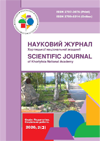UDC : 316.614.4 TECHNOLOGICAL COMPONENTS OF THE CONTEMPORARY PERSONALITY SOCIALIZATION PROCESS FROM THE PERSPECTIVE OF THE AGENT-DEED APPROACH
ДОІ: https://doi.org/10.51706/2707-3076-2020-3-15
Abstract
The article analyzes the approaches of several modern researchers to the interpretation of such
concepts as "socialization", "personality", "socialization of personality" based on generalized definitions of
these concepts in the encyclopedic philosophical dictionary from the perspective of the contemporary
approach. Agreeing with the researchers about the important role of society in personality socialization, the
article is focused on the analysis of real and potential opportunities for the personality in its socialization,
taking into account the living conditions, social environment and time limits of the socialization process.
The two-sidedness of the socialization process is explained, where the personality, on the one hand,
acquires the social experience of the society it belongs to, and on the other hand, actively reproduces and multiplies this experience in the process of its own activity and interaction with other people. The main
directions of socialization are revealed: socio-philosophical, socio-psychological; socio-pedagogical. The
advantages and disadvantages of the subject-subject approach to the personality socialization are discovered,
where the advantages for socialization actors comprise just a certain period of their lives, and then they seek
their place among others beyond the microsociety, and the disadvantage of this approach is that scientists do
not provide ways to activate both sides of the socialization process in different social conditions, because the
social environment can have both positive and negative effects on the personality.
The article emphasizes the viability of the agent-deed approach, which provides for the expansion of
positive social experience of the personality through its positive individual and group activities, based on indepth study and consideration of individual characteristics, real and potential capabilities of the personality as
an actor. It is emphasized in the article that in any case the personality is the bearer of the ability to socialize
and is characterized by five main components of the individual's ability to socialize: 1) a certain tendency and
willingness to socialize; 2) interest in social relations; 3) the bearer of their own social experience; 4) the
availability of a certain social potential; 5) the ability to self-socialize. The basic indicators, which form the basis
of the general technology of the agent-deed approach to personality socialization are presented and explained
in the article: personality attitude to other people; the aptitude of the personality for self-control in
communication and interaction with other people; the aptitude for constructive and reasonable actions. Each
criterion includes: basic qualities; awareness of what to do, why and how; balanced consideration of personal
capabilities and capabilities of other people in the process of cooperation


